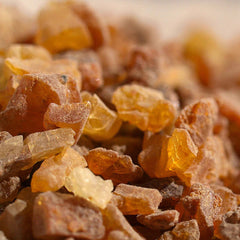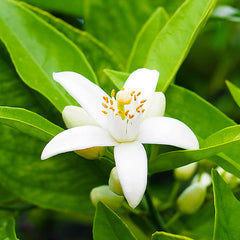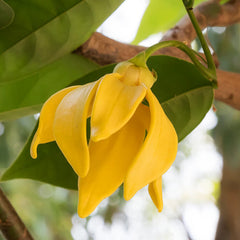What Does Eucalyptus Smell Like?
Click For Affordable Inspired Perfume Alternatives

Embark on a refreshing journey to the serene eucalyptus groves and discover the invigorating aroma of eucalyptus. Native to Australia, eucalyptus trees are known for their distinctive fragrance, offering a sensory experience that captivates the senses. Join us as we explore the question: What does eucalyptus smell like?
What Does Eucalyptus Smell Like?
The fragrance of eucalyptus is a breath of fresh air, characterized by its crisp, menthol-like aroma. Imagine the cool, invigorating scent of mentholated pine combined with a touch of herbal sweetness. Eucalyptus's scent is a celebration of nature, providing a revitalizing and awakening olfactory experience.
Step into the world of eucalyptus, where the fragrance is reminiscent of a brisk, forest breeze. The first olfactory impression is like a breath of fresh air, akin to standing amidst a eucalyptus grove with leaves rustling in the wind. Eucalyptus's scent is an embodiment of freshness, instantly transporting you to the heart of nature with its clean and crisp character.
The scent of eucalyptus is a mentholated coolness, creating a sanctuary of freshness. Picture the invigorating essence of menthol seamlessly blended with the woody undertones of eucalyptus leaves. The aroma is a testament to the cool and refreshing qualities of eucalyptus, providing a sensory experience that mirrors the tranquility of a forest retreat.
While predominantly cool and mentholated, there's a subtle herbal sweetness in eucalyptus's scent. This delicate herbal balance adds depth to the fragrance, creating a well-rounded composition that is both invigorating and subtly sweet. Eucalyptus's aroma is a delightful interplay of cool menthol and herbal sweetness, reminiscent of a harmonious blend in nature.
Delve deeper into the scent, and you may notice a woody serenity that characterizes eucalyptus's fragrance. It's as if the aroma carries the essence of crushed eucalyptus leaves, releasing a calming and grounding olfactory experience. The woody undertones contribute to the overall complexity of eucalyptus's scent, inviting you to connect with the serenity of nature.
Hence, eucalyptus's fragrance is a natural symphony of fresh breeze, mentholated coolness, herbal sweetness, and woody serenity. It stands as a testament to the rejuvenating and balancing qualities of this botanical gem, offering a sensory experience that is both uplifting and calming. Eucalyptus, with its invigorating and complex aroma, invites us to immerse ourselves in the soothing embrace of nature, a fragrant journey that unfolds with every refreshing whiff.
Factors Influencing the Scent of Eucalyptus Essential Oil
Eucalyptus essential oil is a carefully extracted aromatic essence that captures the fresh and invigorating scent of eucalyptus leaves. The formulation of this essential oil involves several factors that contribute to its distinct fragrance. Here are key considerations influencing the scent of eucalyptus essential oil:
-
Eucalyptus Species: There are numerous eucalyptus species, each with its unique aroma. The choice of eucalyptus species influences the overall fragrance profile of the essential oil.
-
Growing Conditions: The climate, soil, and environmental conditions in which eucalyptus trees grow play a significant role in shaping the aromatic compounds present in the essential oil.
-
Harvesting Time: The timing of eucalyptus leaf harvest can impact the oil's fragrance. Leaves harvested at different stages of maturity may yield oils with distinct aromatic nuances.
-
Distillation Process: The method used to extract eucalyptus essential oil, whether through steam distillation or another process, affects the concentration of aromatic compounds and the overall fragrance profile.
-
Chemical Composition: The specific chemical constituents present in eucalyptus essential oil, such as eucalyptol (cineole), contribute to its characteristic scent. Varying concentrations of these compounds influence the aroma's intensity and quality.
-
Geographic Origin: Eucalyptus essential oils sourced from different geographic regions may exhibit subtle variations in fragrance due to environmental and botanical differences.
-
Storage Conditions: Proper storage of eucalyptus essential oil is crucial for maintaining its freshness and preventing oxidation. Dark glass bottles and cool, dark storage environments help preserve the oil's aromatic integrity.
-
Adulteration: The purity of eucalyptus essential oil can be compromised by adulteration or dilution with other substances. High-quality oils undergo rigorous testing to ensure authenticity.
-
Distillation Equipment: The type of distillation equipment used in the extraction process can impact the final fragrance. Modern distillation methods may differ from traditional practices, influencing the aromatic profile.
-
Blending Practices: In some cases, eucalyptus essential oil is blended with other oils or fragrance components to create specific formulations. The choice of blending ingredients can alter the overall scent.
Understanding these factors allows consumers to appreciate the nuanced variations in eucalyptus essential oils and select products that align with their preferences. Whether used for aromatherapy, massage, or personal care, the unique fragrance of eucalyptus essential oil adds a touch of nature's purity to various applications.
What to Look for When Choosing Eucalyptus Essential Oil
Selecting high-quality eucalyptus essential oil ensures an authentic and effective aromatic experience. Consider the following factors when choosing eucalyptus essential oil for your needs:
-
Eucalyptus Species: Different eucalyptus species offer distinct aromatic profiles. Choose an essential oil derived from a species known for its desirable scent and therapeutic properties.
-
Purity and Authenticity: Look for eucalyptus essential oil that is 100% pure and free from additives, fillers, or synthetic components. Authentic oils provide a true representation of the eucalyptus fragrance.
-
Botanical Name: Verify that the essential oil's label includes the botanical name of the eucalyptus species. This ensures clarity regarding the specific type of eucalyptus used.
-
Aroma Description: Read product descriptions or labels to understand the aromatic characteristics of the eucalyptus essential oil. Look for terms such as "fresh," "mentholated," or "herbal" to match your desired scent profile.
-
Extraction Method: Consider the extraction method used to produce the essential oil. While steam distillation is common, variations in distillation practices may influence the final fragrance.
-
Packaging: Choose eucalyptus essential oil packaged in dark glass bottles to protect it from light exposure, which can degrade the oil over time. Amber or cobalt blue bottles are commonly used for this purpose.
-
Source and Origin: Be aware of the geographic origin of the eucalyptus essential oil. Oils sourced from reputable regions known for quality eucalyptus production may offer superior fragrance and therapeutic benefits.
-
Third-Party Testing: Look for essential oils that undergo third-party testing for purity and quality. Independent testing ensures that the oil meets industry standards and is free from contaminants.
-
Certifications: Check for certifications from reputable organizations or associations that confirm the essential oil's adherence to quality and ethical standards.
-
User Reviews: Read reviews from other consumers to gain insights into their experiences with a particular eucalyptus essential oil. Positive reviews often indicate a reliable and satisfactory product.
-
Sustainability Practices: Consider brands that prioritize sustainable and ethical practices in sourcing and production. Supporting environmentally conscious brands contributes to responsible industry practices.
By considering these factors, you can confidently choose a high-quality eucalyptus essential oil that aligns with your preferences and therapeutic needs. Whether used for aromatherapy, massage, or diffusion, a well-selected eucalyptus essential oil enhances your sensory experience and promotes a sense of well-being.
Where to Find Reputable Eucalyptus Essential Oils
-
Specialty Essential Oil Retailers: Explore specialty retailers that focus on essential oils and aromatherapy products. These stores often carry a curated selection of high-quality eucalyptus essential oils.
-
Natural Health Stores: Visit natural health stores that emphasize pure and organic products. These stores may offer a variety of essential oils, including eucalyptus, known for their therapeutic benefits.
-
Online Aromatherapy Retailers: Reputable online platforms specializing in aromatherapy and essential oils provide convenient access to a wide range of eucalyptus essential oils. Ensure the website offers detailed product information and customer reviews.
-
Local Herbal Shops: Herbal shops or apothecaries that prioritize natural remedies may carry eucalyptus essential oils. Inquire about the sourcing and quality standards of the oils available.
-
Farmers' Markets: Some farmers' markets feature vendors selling handmade or artisanal essential oils. Engage with local producers and inquire about their eucalyptus essential oil offerings.
-
Health Food Stores: Many health food stores include an aromatherapy section with essential oils. Check for eucalyptus oils that meet your criteria for purity and quality.
-
Holistic Wellness Centers: Holistic wellness centers often incorporate aromatherapy into their practices. Check if they carry eucalyptus essential oils or can recommend trusted suppliers.
-
Local Craft Fairs: Artisanal craft fairs may feature vendors offering handmade essential oils, including eucalyptus. Attendees can interact directly with producers and learn about their products.
-
Online Marketplaces: Reputable online marketplaces, such as Etsy, may have artisanal sellers offering high-quality eucalyptus essential oils. Read product descriptions and reviews before making a purchase.
-
Aromatherapy Workshops: Attend aromatherapy workshops or classes where experienced practitioners may share information about sourcing and using eucalyptus essential oils. They may also recommend trusted suppliers.
-
Referrals from Aromatherapists: Seek recommendations from certified aromatherapists or holistic practitioners. Professionals in the field often have insights into reliable sources of eucalyptus essential oils.
-
Well-Established Brands: Explore well-established brands known for their commitment to quality in the essential oil industry. Brands with a history of transparency and ethical sourcing are more likely to offer reliable eucalyptus oils.
-
Online Reviews and Forums: Research online reviews and participate in aromatherapy forums to gather recommendations from individuals who have experience with different eucalyptus essential oils. This community feedback can guide your purchasing decisions.
-
Local Essential Oil Distilleries: In regions where eucalyptus is cultivated, local distilleries may produce small batches of high-quality essential oils. Connect with these producers to inquire about their offerings.
-
Natural Beauty Stores: Some stores specializing in natural beauty and skincare products may carry eucalyptus essential oils for their aromatic and skincare benefits.
When purchasing eucalyptus essential oil, prioritize reputable sources that adhere to quality standards, provide clear information about their products, and prioritize sustainability. Taking the time to research and choose a trustworthy supplier ensures a positive and aromatic experience with eucalyptus essential oil.
20 Questions and Answers about Eucalyptus:
-
Q: Can eucalyptus be used in perfumery?
- A: Yes, eucalyptus is used in perfumery for its fresh and medicinal aroma.
-
Q: What type of eucalyptus is commonly used in perfumery?
- A: Eucalyptus globulus is one of the most common species used in perfumery due to its aromatic profile.
-
Q: What notes does eucalyptus contribute to a perfume?
- A: Eucalyptus adds top notes with a refreshing, camphoraceous, and slightly woody scent.
-
Q: Is eucalyptus often used as a standalone fragrance or blended with other notes?
- A: Eucalyptus is commonly used as a blending note to enhance and add complexity to fragrances.
-
Q: What types of perfumes is eucalyptus best suited for?
- A: Eucalyptus works well in fresh and herbal fragrances, often found in perfumes with a clean or medicinal character.
-
Q: Does eucalyptus have any therapeutic properties in perfumery?
- A: Eucalyptus is known for its aromatherapeutic properties, promoting a sense of clarity and relaxation.
-
Q: Can eucalyptus be used in both men's and women's perfumes?
- A: Yes, eucalyptus is versatile and can be used in both men's and women's fragrances.
-
Q: Are there different extraction methods for eucalyptus oil used in perfumery?
- A: Yes, eucalyptus oil can be extracted through steam distillation, and the resulting oil is often used in perfumery.
-
Q: Does eucalyptus oil have any potential side effects in perfumery?
- A: While generally safe, eucalyptus oil can be irritating in high concentrations, so it's important to use it judiciously.
-
Q: Can eucalyptus be used in natural or organic perfumery?
- A: Yes, eucalyptus is suitable for natural and organic perfumery as it can be sourced organically.
-
Q: What fragrance families does eucalyptus complement?
- A: Eucalyptus complements aromatic, herbal, and woody fragrance families.
-
Q: Are there any cultural or historical significances associated with eucalyptus in perfumery?
- A: Eucalyptus has historical significance in Indigenous Australian cultures and has been used traditionally for various purposes.
-
Q: Can eucalyptus be blended with floral notes in perfumery?
- A: Yes, eucalyptus can be blended with floral notes to add a fresh and invigorating aspect to floral fragrances.
-
Q: Is eucalyptus oil commonly used in niche or mainstream perfumery?
- A: Eucalyptus can be found in both niche and mainstream perfumery, depending on the desired fragrance profile.
-
Q: Does eucalyptus oil have staying power in perfumes?
- A: Eucalyptus is a top note with moderate staying power, providing an initial burst of freshness to a fragrance.
-
Q: Can eucalyptus be used in home fragrances, such as candles or diffusers?
- A: Yes, eucalyptus is commonly used in home fragrances due to its pleasant and clean aroma.
-
Q: Are there any unique varieties of eucalyptus that are prized in perfumery?
- A: Eucalyptus citriodora, with a lemon-scented profile, is sometimes sought after for its unique aroma in perfumery.
-
Q: Can eucalyptus be used in creating seasonal or holiday-themed perfumes?
- A: Yes, eucalyptus is versatile and can be used in a variety of perfumes, including those designed for specific seasons or holidays.
-
Q: Does eucalyptus blend well with other essential oils commonly used in perfumery?
- A: Eucalyptus blends well with citrus oils, lavender, rosemary, and other herbal or woody notes.
-
Q: Are there any restrictions or guidelines for using eucalyptus in perfumery due to potential sensitivities?
- A: It's advisable to follow industry guidelines on fragrance concentration and adhere to safety regulations, especially considering eucalyptus can be irritating in high concentrations.
Buy Perfumes - Best Online Retailers
Click For Affordable Inspired Perfume Alternatives
Click For The Best Niche Perfumes & Decants
Pheromone Perfumes - Confidence, Attraction & Appeal - Click For More
Home Fragrances & Candle Warmers - Click To Scent Up Your Spaces Today!



